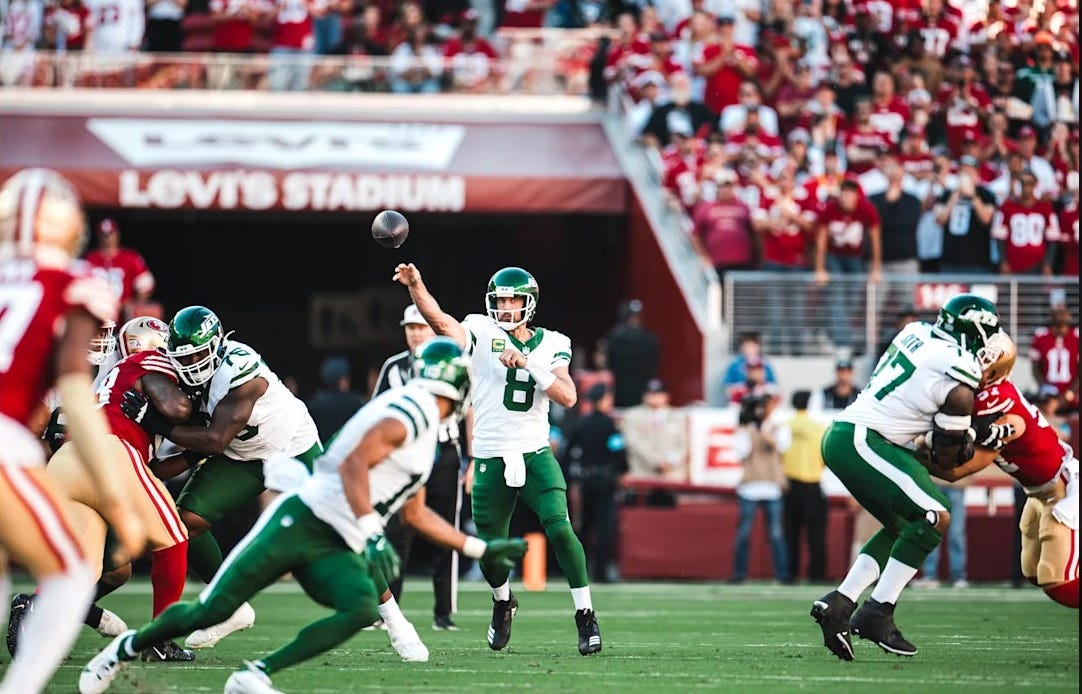Lost in the dark cloud that was the Jets defensive line’s odious performance in Monday night’s 32-19 defeat at San Francisco was the erratic job done by their offensive line colleagues.
As I pointed out in my previous post, it was just one game against the defending NFC champions, so the sample isn’t sufficient to justify any dire warnings. However, count me among the many Jets fans who get triggered into panic attacks when it comes to Gang Green’s blocking effectiveness, or more specifically the lack thereof. The history suggests that the more things change up front, the more it stays the same. No matter who they bring in, their best intentions always seem to be doomed by injuries, misguided coaching, poor efforts, or the combination thereof.
The Jets did make more wholesale changes on the line this offseason, bringing in free agent left tackle Tyron Smith and guard John Simpson and then trading for right tackle Morgan Moses. Those moves were universally praised. With Alijah Vera-Tucker returning from last season’s ACL surgery to man right guard and center Joe Tippmann heading into Year 2, this group had the potential to be New York’s best since probably one of the Nick Mangold/D’Brickashaw Ferguson years a decade ago.
Particularly in paving the way in the running game. Moses and Smith, a future Hall of Famer, ranked 7th and 20th, respectively, in last season’s ProFootballFocus.com’s run blocking grades among the 56 tackles with at least 250 run block snaps. At the time of his injury in Week 5, Vera-Tucker received the fifth best run blocking grade in the league while rotating between guard and tackle.
Which is why it was a little disturbing that the Jets couldn’t get off the ground (no pun intended) in the run game on Monday night, with Breece Hall, who appeared primed for a big season, held to just 32 yards on 12 carries through three quarters as San Francisco rolled to a 26-13 lead. Per sharpfootballanalysis, the Jets posted the lowest rushing yards gained before contact of any team in Week 1. Some of that could be pinned on Hall, as NFL Next Gen Stats had him with minus-0-54 yards over expected per rush attempt. Then again, you’d have thought the design would have called for someone to put a hat on 49ers linebacker Fred Warner on a bunch of those unsuccessful runs.
The excuse that the Jets’ starters didn’t play in the preseason (Tippmann played about a half dozen snaps in the opener) doesn’t hold water. San Fransisco’s All-Pro tackle Trent Williams basically showed up over that weekend with a duffel bag on his shoulder after holding out all training camp for a better contract and dominated New York’s edge rushers. Besides, Jets Head Coach Robert Saleh assured fans that the line was getting suitable reps in team sessions and joint practices with their preseason opponents.
The line’s pass blocking metrics were better, but that was because they can get away with relatively low pass block win rates when Aaron Rodgers is the QB. He was Week 1s quickest draw, per PFF, with an average time to throw of 2.33 seconds. Besides, the 49ers blitzed him just twice in 22 dropbacks, opting to play more coverage. No wonder PFF registered only five Niners pressures, with Vera-Tucker’s whiffed block accounting for the one sack allowed.
When the Jets travel to Tennessee for Sunday’s contest, expect the Titans to test the execution of New York’s offensive line a little more often. They have a first-year defensive coordinator in Dennard Wilson and faced a rookie QB (Chicago’s Caleb Williams) in Week 1, so his tendencies aren’t clear. Still, their 3-4 base all but guarantees that extra rushers will come from somewhere. I believe Rodgers’ extensive experience will enable him to pick most of them out by sight, but can his line execute those adjusted pre-snap instructions?
It is assumed that Rodgers has the authority to change play calls at the line of scrimmage, so I’m not ready to go full-bore outrage on Offensive Coordinator Nathaniel Hackett just yet. However, there was no excuse for three run-run-pass sequences—two of which went for three-and-outs--in the first half. During New York’s best drive of the night in the first quarter, they called for a pass on three of the five first-down plays. The two runs went for a combined three yards. Fortunately, Rodgers’ arm talent allowed New York to move the chains on those series with a pair of bullet passes to Garrett Wilson.
Still, that conservatism had Saleh written all over it. You know, the “win third downs” BS. He could have instructed Hackett and Rodgers to play it that way through the scripted game plan. Never mind that the Jets (6-for-10) boasted a better third down conversion percentage than the Niners (6-for-13), who pretty much didn’t need to see third downs until they got into field goal range.
I don’t see the leopard changing his spots after three-plus years just for Sunday. That the Jets won’t be facing a legitimate Super Bowl contender, I think, makes it more likely they’ll play it safe, putting the onus on their chagrined defense against shaky sophomore Will Levis to try to win a slog.
Better hope both lines show up this time.
Prediction: Jets 16 Titans 13



